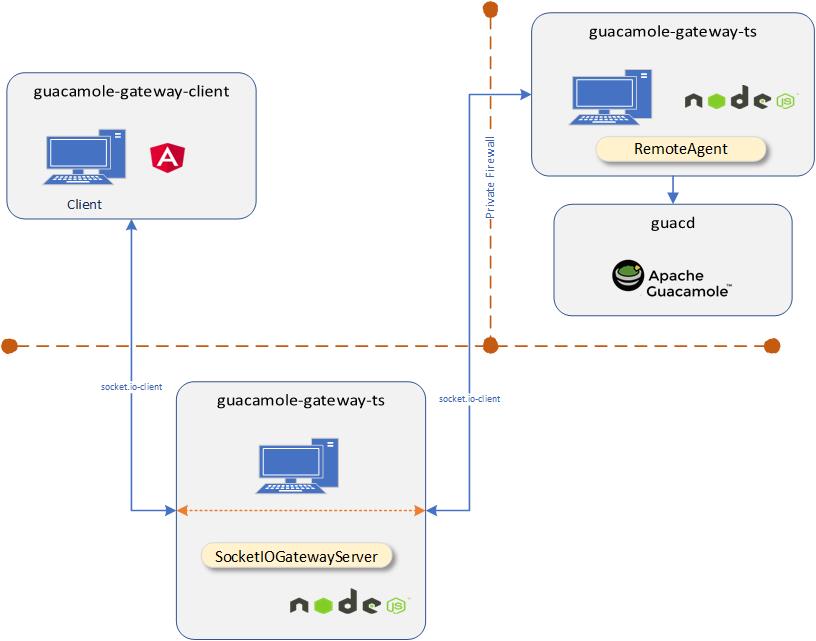guacamole-gateway-ts
v0.0.2
Published
NodeJs Typescript Socket.io gateway for guacamole
Downloads
13
Maintainers
Readme
guacamole-gateway-ts
Synopsis
Typescript guacamole-gateway-ts is a NodeJS replacement for guacamole-client (server-side Java servlet). Guacamole is a RDP/VNC client for HTML5 browsers. This is a fork of vadimpronin excellent work on guacamole-lite.
This solution allows dynamic control of encryption and decryption inside your node. This also requires an express server and socket.io.
This diagram describes the architecture of Guacamole and the role of guacamole-gateway-ts in it:

Installation
npm install --save guacamole-gateway-tsTo connect to guacamole-gateway-ts as a client please see the Angular component 'guacamole-gateway-client' NPM Link
Setting up the Server
import { Server as httpsServer, createServer } from 'https'; //Secure for SSL
import express, { Request, Response, NextFunction } from "express";
import { SocketIOGatewayServer, logLevel, log_settings, preProcess } from 'guacamole-gateway-ts';
var listen_port = 4823;
var app = express();
var options = {
key: readFileSync("/{{path to key}}/key.pem", "utf8"),
cert: readFileSync("/{{path to key}}/certbundle.pem", "utf8"),
};
var server: httpsServer = createServer(options, app);
const guacdOpt: guacdOptions = {
port: 4822 // default guacd port
};
//Setting up log options is optional.
const log_options: log_settings = {
level: logLevel.DEBUG,
stdLog: (...args) => {
console.log('[GATEWAY LOG]', ...args);
},
errorLog: (...args) => {
console.error('[GATEWAY ERROR]', ...args);
}
}
//This is a sample authentication callback that will be processed prior to any connections being made. Excluding this and left unsecured is not advised.
const auth: preProcess = async ( options: {auth: any, type?: 'client'|'agent'}, callback: (error: any, room: string) => void ): Promise<void> => {
try {
if( options.auth && options.auth.optionalExtraAuthenticaitonToken){
switch(options.type){
case 'client':{
//browser
//Do your authenticaiton and identification here. Simply pass the "room" the client will connect to. The agent will need to do its own authentication and indentification and then match this room
return callback(null, "my_custom_roomXYZ");
break;
}
case 'agent':{
//remote agent (machine you want to RD into)
//Do your authenticaiton and identification here. Simply pass the "room" the agent will connect to. The client will need to do its own authentication and indentification and then match this room
return callback(null, String(rmmClient.bbo_contnum));
break;
}
}
}
} catch (err) {
console.error(err);
return callback(err, '');
}
console.error('Invalid Login Attempt');
return callback(new Error('Invalid Login Attempt'), '');
}
const socketIOGateway: SocketIOGatewayServer = new SocketIOGatewayServer(server, log_options, auth);
socketIOGateway.on('open', (clientConnection) => { console.log('OPEN', clientConnection) });
socketIOGateway.on('close', (clientConnection) => { console.log('CLOSE', clientConnection) });
socketIOGateway.on('error', (clientConnection, error) => { console.error(clientConnection, error) });
server.listen(listen_port, () => {
console.log('Guacamole Gateway Server - online and listening on port: ' + listen_port);
});
Log levels
clientOptions.log.level defines verbosity of logs. Possible values are:
- "QUIET" - no logs
- "ERRORS" - only errors
- "NORMAL" - errors + minimal logs (startup and shutdown messages)
- "VERBOSE" - (default) normal + connection messages (opened, closed, guacd exchange, etc)
- "DEBUG" - verbose + all OPCODES sent/received within guacamole sessions
Custom log functions
By default guacamole-gateway-ts uses console.log and console.error functions for logging.
You can redefine these functions by setting clientOptions.log.stdLog
and clientOptions.log.errorLog like in the example below. Note that clientOptions.log.level
is still applied, which means that messages that don't match desired log level won't be
sent to your custom functions
const clientOptions = {
log: {
level: 'DEBUG',
stdLog: (...args) => {
console.log('[MyLog]', ...args)
},
errorLog: (...args) => {
console.error('[MyLog]', ...args)
}
}
};
